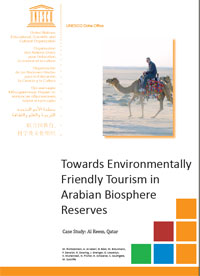Towards Environmentally Friendly Tourism in Arabian Biosphere Reserves
A case study: Al Reem, Qatar (UNESCO Doha Office)

UNESCO Biosphere Reserves share with ecotourism the ambition to create a sustainable relationship between people and the environment.
Not all those who travel are tourists in the Gulf Region. Migrant workers and professionals of all socio-economic classes travelling to and from Gulf Nations are not necessarily tourists; but they do contribute towards tourism and economic growth within the region when they decide to spend their holidays within the country they reside or within the broader Gulf sub-region or the Middle East region.
The growing prosperity of the Gulf and Middle East is likely to continue to attract an increasing number of travellers and tourists. UN World Tourism Organization estimates that although Europe, Americas and East Asia and the Pacific will together account for 88.5% of the world tourism's market by 2020, for the period from 1995 to 2020, tourists arrivals in the Middle East will grow at 6.7% per annum outpacing its nearest rivals in East Asia and the Pacific (6.5%) and South Asia (6.2%) respectively.
Related links:
:: "Towards Environmentally Friendly Tourism in Arabian Biosphere Reserves" [.pdf]
:: People, Biodiversity & Ecology (More)
:: UNESCO Natural Sciences in the Arab States (More)
- Source:UNESCO SC - Doha Office
- 18-02-2009

